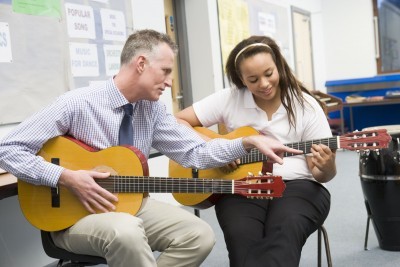
I was reading some posts on an internet guitar forum the other day and somebody posed this seemingly simple question:
“I have a question for all of the experienced guitarists on this site. What is a great technique and exercise to build up your hands and your finger strength?”
Several people responded with some good suggestions, to which the original poster responded:
“Well I am a beginner. And I mean absolute beginner. I just got my late Father’s 1995 Midnight Blue Fender Telecaster and I am wanting to learn everything including the jargon. Hammer on and pull off? I have no idea what that means. And these words – Chromatic scales, pentatonic scale, 42 42 41 41 42 42 high to low (24 24 14 14 24 24 low to high), and downstroke and alternate with upstrokes and amimamim. So please help me I am lost completely.”
So now we’ve identified the real issue. Trying to learn all of this on your own without some kind of individual instruction puts one at a severe disadvantage. There is a ton of information available nowadays (really “too much information”). Lots of it is good, but since anybody can post a video to youtube or post their opinion on an internet forum, it can also sometimes be like the the blind leading the blind and without proper guidance from an experienced teacher, trying to sift through all of it on your own can quickly turn into a fools errand.
Finding the right teacher in the beginning, when you’re first developing your habits will probably cost a bit, but compared the time you’ll waste going down dead ends trying to learn all this on your own, it’s WELL worth it. Also note that you shouldn’t choose a teacher based soley on price (there are lots of people out there who will take your money and really don’t know that much about music, you want to make sure that the person you study with is truly qualified). Make sure that they are going to teach you the following skills; Reading Music, Technique, Theory, Ear-Training & Repertoire. These are the CORE skills that every great musician has. Some might argue about reading because there have been a few great musicians who have done it without learning to read, but it’s important to realize that they were the exception and not the rule. Not knowing the basics of reading music puts you at a severe disadvantage because it makes learning all the other skills MUCH more difficult to learn. Skipping this valuable skill may seem like a shortcut, but it ultimately is just a detour and diversion from your ultimate goal of learning the guitar and becoming a better musician.
Now back to the person’s original question I’d like to point out that it’s usually NOT about finger “strength” but rather about independence and accuracy of placement. Most beginners tend to think that their hands aren’t “strong enough” or are “too small” but this is RARELY the case. It usually has much more to do with holding the instrument properly and hand position. These are things that are difficult to figure out on your own or by simply watching some videos on the internet, but a good teacher in a one-on-one learning situation will be able to help with these kinds of technique issues tremendously.
Also, try to stay away from just doing exercises that are only about the hands. EVERYTHING that you practice should have a MUSICAL purpose. Scales; Major, Melodic Minor, Harmonic Minor, Pentatonic, Whole-Tone, Diminished and Chromatic. Arpeggios for all chord types but starting with the simple triads; Major, Minor, Diminished and Augmented, and then moving to the many types of Seventh chords. Chord form studies (which you create yourself at first by simply taking any two consecutive chords in a song you want to learn and practice moving back and forth between those in time until it feels natural, etc.)
But in the end, it boils down to finding a good teacher; one who can save you time by leading you through the seemingly vast maze of musical knowledge and helping you to develop your core skills as a musician. If you know some good professional working musicians in your area, you could start by asking them. The music scene is a pretty tight knit community and most working musicians also teach. If there’s a college with a music program near you (most of them do have music nowadays) you might want to ask who the guitar teacher is and contact them about lessons. Just about everybody teaching instrumental music at a college works as an adjunct so they may teach at multiple schools and probably also teach private students at our own studios, plus you know that the college wouldn’t hire them if they weren’t good at what they do.
Hope this helps.
